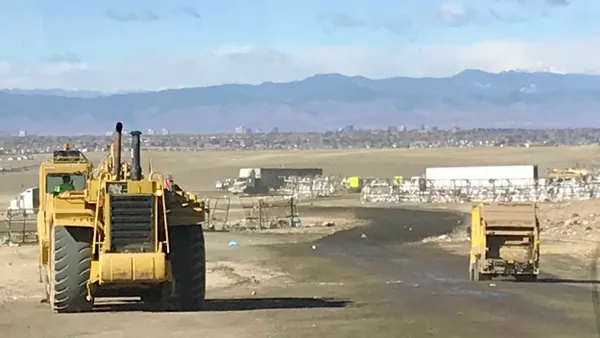Dive Brief:
- The National Waste & Recycling Association, along with the U.S. Chamber of Commerce and Associated General Contractors of America, has offered new details on their formal petition asking a federal court to review the U.S. EPA’s designation of certain PFAS as hazardous substances under the Comprehensive Environmental Response, Compensation and Liability Act.
- In a filing submitted Friday, the groups list six issues they want the court to consider under their petition to review the EPA’s final rule. That includes determining whether the EPA incorrectly interpreted Superfund when making the rule, whether the agency should have considered costs associated with setting such a rule, and whether it violated the U.S. Constitution by “imposing retroactive liability,” among other issues.
- Environmental groups represented by an attorney for Earthjustice are challenging the group’s petition, saying the hazardous substance designation is critical to helping communities affected by health issues caused by PFAS contamination. The court has not yet set a briefing schedule for the case.
Dive Insight:
The U.S. EPA has made several major decisions about how to regulate PFAS in the past year, but the waste industry sees its announcement of an official hazardous substance designation for two per- and polyfluoroalkyl substances, PFOA and PFOS, as having the most direct impact on operations.
When the EPA announced the final rule in April, it noted the move was meant to hold polluters accountable for cleaning the “widely used” PFAS. The EPA is targeting such chemicals under the Comprehensive Environmental Response, Compensation and Liability Act, known as CERCLA or Superfund.
Industry groups say they are “passive receivers” of PFAS, meaning they do not generate PFAS or have control over PFAS-containing items that enter their facilities. NWRA and other groups have asked Congress for a CERCLA exemption since 2022 due to such liability concerns, and a related federal bill on the matter has not moved forward. Though the EPA has said it does not intend to pursue enforcement at some landfill entities, the industry groups say the wording is not specific enough to protect them from potential negative impacts.
NWRA and the other groups first filed their lawsuit on June 10 in the U.S. Court of Appeals for the D.C. Circuit. NWRA declined to comment on the case, saying the U.S. Chamber is taking the lead on responses, but the association has long been vocal about its concerns with the hazardous substance designation.
NWRA and other industry groups believe the designation could lead to unintended consequences that might force landfills to reject PFAS-containing material, incur major costs for sorting or processing the material or face PFAS-related lawsuits. The EPA separately issued a rule regulating certain PFAS in drinking water, which could have an added impact on waste management issues such as leachate management at water treatment facilities.
The lawsuit’s Statement of Issues document filed July 12 offers more insight on why the groups are pursuing a legal challenge. In the filing, one of the groups’ concerns is whether the court thinks the EPA was responsible for imposing “retroactive liability” with the hazardous substance rule. The document also asks the court to determine whether the EPA failed to provide “adequate notice and opportunity” to comment on the proposed rule and whether it offered an “adequate and reasonable explanation” for why it determined PFOA and PFOS should be designated as hazardous substances. It also called for a look at whether the EPA generally acted “arbitrarily, capriciously, or in a manner otherwise contrary to law” when establishing the final rule. The groups may raise additional issues in the future, according to the filing.
“EPA’s new rule fails to provide clear standards for determining whether to designate a substance as hazardous under CERCLA, creating staggering uncertainty for local governments, landowners, and businesses about the potential for future new designations," said Chuck Chaitovitz, the U.S. Chamber’s vice president for environmental affairs and sustainability, in an emailed statement.
The U.S. Chamber says it supports efforts to clean up PFOA and PFOS, but Chaitovitz said those efforts “will take a back seat to decades of counterproductive litigation stemming from this new rule.” The Chamber is calling for using “other, more effective approaches to clean up legacy PFOA and PFOS.”
In a statement after the legal challenge was announced in June, AGC said it also believes in pursuing responsible PFAS cleanup measures, but believes the hazardous substance designation will create new legal and financial strains for contractors, including possible liability issues and stricter waste disposal practices.
Community and environmental groups Clean Cape Fear, the Environmental Justice Task Force, Fight for Zero, Merrimack Citizens for Clean Water and the Natural Resources Defense Council have pushed back against the legal challenge. The U.S. EPA takes no position on the group’s motion, according to court documents.
The CERCLA designation helps remove barriers communities face in receiving timely PFAS cleanup services that are paid for by polluters instead of taxpayers, they said in court documents.
Each of the environmental groups represent communities that they say have been harmed by PFAS pollution, especially people in lower-income neighborhoods and those already exposed to other types of pollution.
“Historically, the communities most burdened by PFAS contamination have often borne the costs of PFAS remediation as well, resulting in increased water rates and depleted local and state government budgets,” they said in the filing.
Without such a designation under CERCLA, “the cleanup of PFOA and PFOS contamination has been haphazard, slow, and infrequent,” the groups said.
The court has ordered any additional challengers to file submissions by July 29. The EPA has not yet responded to a request for comment.











